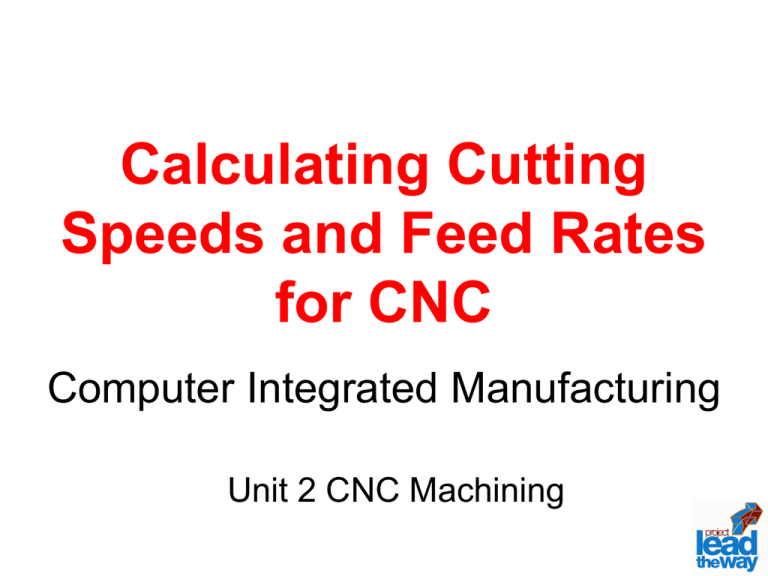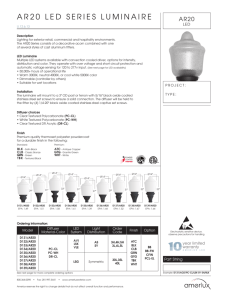3 - Cutter Speeds And Feeds
advertisement

Calculating Cutting Speeds and Feed Rates for CNC Computer Integrated Manufacturing Unit 2 CNC Machining In this lesson • Discuss different Cutting Tools. • Calculate Cutting Speeds and Feed Rates. • Practice. • Download reference materials to share with your students. Basic Cutting Tools Center Cutting End Mill Ball End Mill Non- Center Cutting End Mill Indexable Shell Mill Obtain Reference Charts Click here to open Cutting Speed Chart. Click here to open Tool Feed Chart. Click here to open Drilling Feed Chart. Calculating Spindle Speeds Cutting Speed Obtained From Machinist Handbook CS x 4 RPM = Diameter Revolutions per Minutes Tool Diameter Recommended Cutting Speeds Milling Speeds for High Speed Steel Tools Material Cutting Speed in surface ft/min. Magnesium 300 Aluminum 250 Brass and Bronze 150 Copper 100 Cast Iron (Soft) 80 Cast Iron (Hard) 50 Mild Steel 90 Cast Steel 80 Alloy Steel (Hard) 40 Tool Steel 50 Stainless Steel 60 Titanium 50 High Manganese Steel 30 Note: Double Speed for Carbide Cutting Tools Example What spindle speed should be used to Mill Aluminum with a ½ inch End Mill? CS x 4 RPM = Diameter Cutting Speed for Aluminum is 250 surface ft./min. Example What spindle speed should be used to Mill Aluminum with a ½ inch End Mill? CS x 4 RPM = Diameter Cutting Speed for Aluminum is 250 surface ft./min. RPM = 250 x 4 .5 = 2000 Your turn, ex. Spindle Speed What spindle speed should be used to mill Soft Cast Iron with a ¼ in. End Mill? CS x 4 RPM = Diameter Cutting Speed for Soft Cast Iron is 80 surface ft./min. RPM = 80 x 4 .250 = 1280 Calculating Feed Rates Fm = ft x nt x N Fm = Feed Rate in inches/min. ft = Feed in inches / tooth nt = number of teeth on the tool N = Spindle Speed Recommended Tool Feed Tool Feed (in/tooth) Material Face Mill Side Mill End Mill Magnesium .005-.020 .004-.010 .005-.010 Aluminum .005-.020 .004-.010 .005-.010 Brass and Bronze .004-.020 .004-.010 .005-.010 Copper .004-.010 .004-.007 .004-.008 Cast Iron (Soft) .004-.016 .004-.009 .004-.008 Cast Iron (Hard) .004-.010 .002-.006 .002-.006 Milt Steel .004-.010 .002-.007 .002-.010 Alloy Steel (Hard) .004-.010 .002-.007 .002-.006 Tool Steel .004-.008 .002-.006 .002-.006 Stainless Steel .004-.008 .002-.006 .002-.006 Titanium .004-.008 .002-.006 .002-.006 High Manganese Steel .004-.008 .002-.006 .002-.006 Note: Double Speed for Carbide Cutting Tools Example Feed Rate Calculate the Feed Rate for End Milling Aluminum with a 2 flute, ½ inch HSS end mill. Fm = ft x nt x N ft=.005 in. / tooth Example Feed Rate Calculate the Feed Rate for End Milling Aluminum with a 2 flute, ½ inch HSS end mill. Fm = ft x nt x N ft=.005 in. / tooth N= nt= 2 teeth = 250 x 4 .5 = 2000 rpm Fm = .005 x 2 x 2000 Fm = 20 in/min. Your turn, ex. Feed Rate Calculate the Feed Rate for Face Milling Aluminum with a 4 flute, ¾ inch HSS end mill. Fm = ft x nt x N ft=.005 in. / tooth N= nt= 4 teeth = 250 x 4 .75 = 1333.33 rpm Fm = .005 x 4 x 1333.33 Fm = 26.67 in/min. Factors That Affect Feed Rates Power of Spindle Motor Condition of Cutting Tool Depth of Cut Quality of surface finish required Roughing vs. Finish cuts Condition of the machine Strength of Fixture Tool Feed Rate for Holes Penetration rate in inches/rev. Tool Feed Rate (ipm) = ipr x rpm Feed in inches/min. Spindle speed in rev./min. Professional Development Lesson ID Code: 6004 Recommended Drilling Feeds Drilling Feeds Drill Diameter (in.) Drill Feed Rate (ipr) <⅛ .001-.002 ⅛–¼ .002-.004 ¼-½ .004 - .007 ½-1 .007 - .015 >1 .015-.025 Drill Feed Example What tool feed rate should be used for drilling a .375 inch hole in aluminum? Tool Feed Rate (ipm) = ipr x rpm 250 x4 RPM = .375 2,666 RPM Drill feed: ¼ - ½ diameter: .004 - .007 Tool Feed Rate (ipm) = .005 x 2,666 ipm = 13.33 Your Turn, Ex. Drill Feed What tool feed rate should be used for drilling a .25 inch hole in copper? Tool Feed Rate (ipm) = ipr x rpm 100 x4 RPM = .25 1,600 RPM Drill feed: ¼ - ½ diameter: .004 - .007 Tool Feed Rate (ipm) = .004 x 1,600 ipm = 6.4 Special Operations CS x 4 RPM = Diameter Other Special Operations require slower speeds: Reaming – ½ to ⅔ of that used for drilling the material Counterboring – ¼ of that used for drilling the material Countersinking – ¼ of that used for drilling the material Tapping (threading) – determined by many factors (usually range from 50 to 300 RPM) Curriculum Alignment: Unit 2 – CNC Machining Section 2.5 – Precision Measurement References: Kibbe, R.R. & Neely, J.E. & Meyer, R.O. & White, W.T. (2002). Machine Tool Practices, Upper Saddle River, NJ: Prentice Hall. Oberg, E. & Jones F. D. & Horton, H. L. & Ryffell, H. H. (2000). Machinery’s Handbook, 26th ed., New York, NY: Industrial Press Inc. Credits: Writer: Ken McDermith Content Editor: Donna E. Scribner Narration: Donna E. Scribner PLTW Editor: Ed Hughes Production: CJ Amarosa Video Production: CJ Amarosa Audio: CJ Amarosa Project Manager: Donna E. Scribner





